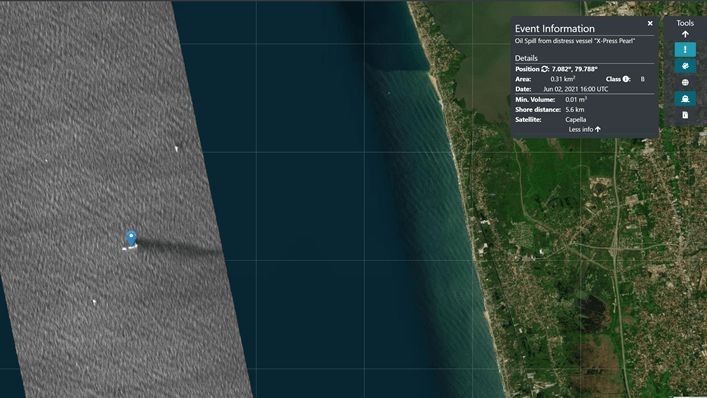The shipwreck’s owner said no oil spilled. Satellites disagree
This data can help emergency responders and be used as evidence in legal disputes. …

In 2018, thousands of emigrants from Africa and the Middle East risked their lives crossing the Mediterranean Sea to Europe in small, overcrowded boats. Juan Peña Ibáñez and Pablo Benjumeda Herreros had a unique vantage on the humanitarian crisis: They flew in search and rescue aircraft for Spain’s Maritime Safety Agency, equivalent to the US Coast Guard. At the time, as many as 30 boats approached Spain daily.
“From the aircraft I can only see 15, 20, 30 miles. I need to monitor hundreds of miles,” Benjumeda said. “We had reduced capabilities in that moment, it’s very frustrating. Every single life you lose at sea, you say, there must be something that we can do better.”
For Benjumeda and Peña, the answer was returning to the university for advanced degrees in remote sensing, and launching a company, Orbital EOS, that uses satellite data to more efficiently monitor the world’s oceans for all kinds of activity.
“We used to do four-hour patrols with our high-tech aircraft,” Peña says. “The area [we saw] in four hours is imaged by a satellite in 30 seconds.”
Orbital EOS analyzes data collected by radar satellites in orbit, which bounce radio waves of objects below and measure the reflections. This information is precise enough that machine learning software that can identify substances floating on top of water, like oil and chemical spills, by differences in their surface tension. This is a rare capability, and became the first service Peña and Benjumeda offer.
An opportunity to demonstrate the technique arrived with a maritime accident near Sri Lanka. In May, the shipping vessel X-Press Pearl suffered a catastrophic fire and sank, spilling its cargo of chemicals and micro plastics into the sea. Residents are already seeing catastrophic impacts on local marine life. The owner of the ship and Sri Lanka’s government say that no oil has spilled from the vessel. Orbital EOS’ analysis of recent data collected by Capella satellites produces a different picture. Analysis of the radar data (shown below overlaid on a satellite map in Orbital’s dashboard) suggest that hundreds of tons of oil spilled from the vessel, represented in gray:

Orbital EOS
That’s not a huge spill compared to others, Benjumeda said, but “the problem with the oil is that the wreck is only 7 km offshore and the wind and currents are constant to the coastline, consequently, any single drop of oil will reach the coast in a very brief time.” This data can help emergency responders, but could also be used as evidence in legal disputes over who is liable for the consequences of this disaster.
One key tool toward that end are the newest generation of small satellites, which can capture information about a place on earth far more frequently and on-demand than their predecessors, and often at a lower cost. Orbital EOS relies on data collected by Capella Space’s radar satellites to track fast-moving events around the world, which makes its insights more valuable in real-time.
While this pollution has attracted international attention, many do not—and even small spills can have serious environmental impact. Orbital EOS wants to help government regulators better enforce pollution rules, and companies spot leaks and avoid waste. Now the firm is scaling up, raising money and looking to add new services that benefit from frequent revisits, like power line monitoring. It’s another example of how space technology is becoming a normal part of solving problems on earth.
“We were end users of many solutions when we were at the coast guard, [so it is] easy for us to identify the gaps in the technology,” Benjumeda says. “We started the whole design of the solution from there, from the user perspective—if I am the coast guard and I have to deal with an oil spill.”
A version of this story was originally published in Quartz’s Space Business newsletter.